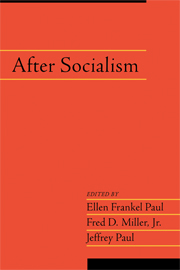Book contents
- Frontmatter
- Contents
- Introduction
- Acknowledgments
- Contributors
- Can There Be an “After Socialism”?
- The Cultural Contradictions of Socialism
- The Idol of History
- Backwards into the Future: Neorepublicanism as a Postsocialist Critique of Market Society
- What's Left of the Welfare State?
- The Roots and Rationale of Social Democracy
- An Interpretation and Defense of the Socialist Principle of Distribution
- Some Feasible Alternatives to Conventional Capitalism
- After Socialism: Mutualism and a Progressive Market Strategy
- Sovereignty, Commerce, and Cosmopolitanism: Lessons from Early America for the Future of the World
- Beyond Fear and Greed?
- Liberalism's Divide, After Socialism and Before
- INDEX
Beyond Fear and Greed?
Published online by Cambridge University Press: 01 June 2010
- Frontmatter
- Contents
- Introduction
- Acknowledgments
- Contributors
- Can There Be an “After Socialism”?
- The Cultural Contradictions of Socialism
- The Idol of History
- Backwards into the Future: Neorepublicanism as a Postsocialist Critique of Market Society
- What's Left of the Welfare State?
- The Roots and Rationale of Social Democracy
- An Interpretation and Defense of the Socialist Principle of Distribution
- Some Feasible Alternatives to Conventional Capitalism
- After Socialism: Mutualism and a Progressive Market Strategy
- Sovereignty, Commerce, and Cosmopolitanism: Lessons from Early America for the Future of the World
- Beyond Fear and Greed?
- Liberalism's Divide, After Socialism and Before
- INDEX
Summary
INTRODUCTION
Let us assume, for the sake of argument, that socialism is over. (It looks to me as if this is very much open for debate. In some respects, the collapse of the Soviet Union has given Marxist socialism a new lease on life. It is no longer stuck with the heritage of “actually existing socialism,” and can, instead, develop its more plausible, critical side and tell stories of the revolution betrayed.) Be that as it may, it is now widely accepted that socialism, understood as involving the social ownership of the means of production and the abolition of markets, faces real and perhaps insuperable difficulties. For without both markets and individual ownership, it is difficult to see how problems of individual motivation and information transmission are to be tackled—to say nothing of Ludwig von Mises's underlying concern with how to make economic (as opposed to purely technical) decisions about the utilization of resources within an economy.
Now, there is obviously a sense in which, if this point is granted, socialism could still be very much alive. For one might think of socialism as involving two interrelated themes: first, an espousal of equality and radical forms of democracy, and second, the limitation of power differentials, and the theory that these concerns should be addressed through social ownership of the means of production and the abolition of markets.
- Type
- Chapter
- Information
- After Socialism , pp. 247 - 277Publisher: Cambridge University PressPrint publication year: 2003

